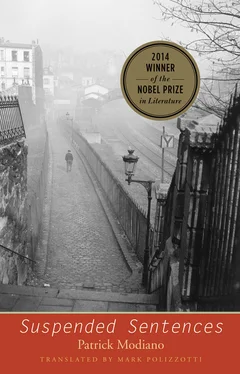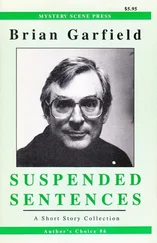“A former sentinel from Rue Lauriston is now a doorman at a nightclub.”
How did he know that? I didn’t have the presence of mind to ask.
“Would you like to see him?”
We followed Boulevard de Clichy and stopped in Place Pigalle, next to the fountain. It was around nine in the evening.
“That’s him …”
He pointed out a man in a navy blue suit standing post in front of Les Naturistes.
At around midnight, we were walking up Rue Arsène-Houssaye, at the top of the Champs-Elysées, where Claude Bernard had parked his car. And we saw him again. He was still wearing his navy blue suit. And sunglasses. He stood immobile on the sidewalk, in the space between two neighboring cabarets, so that one couldn’t exactly tell which one he worked for.
I would have liked to ask him about Pagnon, but I felt awkward as soon as we passed in front of him. Later, I looked up his name among the other members of the gang. Two young men had served as lookouts on Rue Lauriston: a certain Jacques Labussière and a certain Jean-Damien Lascaux. Labussière, at the time, had lived on Rue de la Ronce in Ville-d’Avray and Lascaux somewhere near Villemomble. They had both been handed life sentences. Which one was he? I didn’t recognize him from the blurry photos that had appeared in the newspapers at the time of the trials.
I ran into him again, around 1970, on the sidewalk of Rue Arsène-Houssaye, still standing at the same place, with the same blue suit and the same sunglasses. A sentinel for all Eternity. And I wondered whether he wore those sunglasses because after thirty years his eyes had worn out from seeing so many people go into so many sleazy places …
Several days later, Claude Bernard had rummaged in a closet at the back of his bookstore and taken out this letter that he gave me, which dated from the Occupation. I’ve kept it all these years. Was it addressed to him?
My dearest love, my adored man, it is one in the afternoon; I’ve woken up very tired. Business not so good. I hooked up with a German officer at the Café de la Paix, brought him to the Chantilly, did two bottles: 140 francs. At midnight he was tired. I told him I lived a long ways away, so he rented me a room. He took one for himself. I got a kickback on both and he gave me 300 francs. That got me my 25 louis. He’d made a date with me for last night in the lobby of the Grand Hôtel, but at seven, when we were supposed to meet, he showed up all apologetic and showed me his orders to ship out to Brest. After my failed date, I said to myself, “I’ll go to Montparnasse to the Café de la Marine and see if Angel Maquignon is there.” I went. No Angel. I was about to take the subway home when two German officers picked me up and asked me to go with them, but I could see they were idiots so gave them the brush. I went back to Café de la Paix. Nothing doing. When Café de la Paix closed, I went to the lobby of the Grand Hôtel. Nada. I went to the bar at the Claridge. Bunch of officers having a staff meeting with their general. Nothing. I returned to Pigalle on foot. On the way, nothing. It was about one in the morning. I went into Pigalle’s, after checking in at the Royal and at the Monico, where there wasn’t anything. Nothing at Pigalle’s either. Heading back out, I ran into two hepcats who took me with them, we sank two bottles at Pigalle’s, so 140 francs, then we went to Barbarina, where I got another 140 francs. This morning at six-thirty I staggered home to bed, completely worn out, with 280 francs. I ran into Nicole at Barbarina, you should have seen her get-up … If you could have been there, my poor Jeannot, you’d have been ill …
Jacqueline
Who was that Angel Maquignon, whom this Jacqueline was going to meet at Café de la Marine? In the same café, a witness claimed to have seen Gisèle and Urbain T., that night in April when they’d mixed with bad company in Montparnasse.
The Champs-Elysées … It’s like that pond a British novelist talks about, at the bottom of which, in layered deposits, lie the echoes of the voices of every passerby who has daydreamed on its banks. The shimmering water preserves those echoes forever and, on quiet evenings, they all blend together … One evening in 1942, near the Biarritz cinema, my father was picked up by Inspector Schweblin and Permilleux’s stooges. Much later, toward the end of my childhood, I accompanied him to his meetings in the lobby of the Claridge and the two of us went to have dinner at the Chinese restaurant nearby, whose dining room was upstairs. Did he occasionally glance at the sidewalk across the avenue, where years earlier the Black Maria had been waiting to take him to the holding cell? I remember his office, in the ochre building with large bay windows at 1 Rue Lord-Byron. By following endless corridors, one could exit onto the Champs-Elysées. I suspect he had chosen that office for its double exit. He was always alone up there with a very pretty blonde, Simone Cordier. The telephone would ring. She’d pick up:
“Hello? … Who’s calling, please?”
Then, turning to my father, she whispered the name. And she added:
“Should I tell him you’re here, Albert?”
“No. I’m not here for anyone …”
And that’s how the afternoons passed. Empty. Simone Cordier typed letters. My father and I often went to the movies on the Champs-Elysées. He took me to see revivals of films he’d enjoyed. One of them featured the German actress Dita Parlo. After the movie, we walked down the avenue. He had told me in a confiding tone, which was unusual for him:
“Simone was a friend of Dita Parlo’s … I met the two of them at the same time.”
Then he’d fallen silent, and the silence between us lasted until Place de la Concorde, where he’d asked me about my studies.
Ten years later, I was looking for someone to type up my first novel for me. I had found Simone Cordier’s address. I called her. She seemed surprised I should still remember her after all that time, but she made an appointment to see me at her home on Rue de Belloy.
I entered the apartment, my manuscript under my arm. First she asked me for news of my father and I didn’t know what to answer, as I didn’t have any.
“So, you’re writing novels?”
I answered yes in a halting voice. She showed me into a space that must have been the living room, but it no longer had any furniture. The tan paint on the walls was peeling in spots.
“Let’s go to the bar,” she said.
And with an abrupt movement she pointed to a small white bar at the back of the room. The gesture had struck me at the time as rather offhanded, but now I realize how much shame and confusion it masked. She went to stand behind the bar. I put my manuscript down on it.
“Shall I pour you a whiskey?” she asked.
I didn’t dare say no. We were both standing, on opposite sides of the bar, in the dim light of a wall lamp. She poured herself a whiskey as well.
“Do you take it the same as me? Neat?”
“Sure.”
I hadn’t had whiskey since the Danish girl had given me some at Chez Malafosse, so long before …
She downed a large gulp.
“So you want me to type all that for you?”
She pointed to the manuscript.
“You know, I haven’t been a typist in a long time …”
She hadn’t aged. The same green eyes. The beautiful architecture of her face had remained intact: her forehead, the arch of her eyebrows, her straight nose. Only her skin had gone a bit florid.
“I’ll have to get back into the swing of it … I’ve gotten kind of rusty.”
I suddenly wondered where she could possibly type anything in that empty room. Standing, with the typewriter resting on the bar?
“If it’s a problem,” I said, “we can forget it …”
“No, no, it’s no problem …”
Читать дальше












